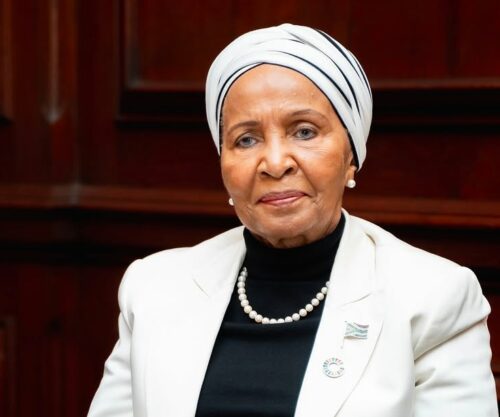
If you are married, it’s important to understand what will happen to your marital property when you die. Samke Mhlongo explains what is involved when claiming from your spouse’s estate after their death.
Picture this: you’re watching an African movie about a loving husband, his wife and their two young children. The husband dies from a car accident, illness or the Nollywood favourite – witchcraft! His family comes over to comfort the grieving widow and arrange the burial. But, before the last of aus Martha’s funeral biscuits have been consumed, the conversation has shifted to how his estate will be chopped up. It’s a sad, yet predictable storyline that continues to play out in real life too, unless we continuously educate ourselves and take the necessary actions to correctly manage our finances.
DID YOU KNOW?
I was shocked to learn that being married in community of property (COP) does not mean that you are entitled to your spouse’s half share of the joint estate when they die. Additionally, if you are divorced or even remarried, and have forgotten to remove your ex-spouse as a beneficiary on your life policy, guess who will be crying tears of joy at your funeral? I was flabbergasted after speaking about the workings of a deceased estate to two legal experts Faeeza Khan, senior specialist: legal marketing at Liberty, and advocate Thembi Ntoane, member of the Johannesburg Bar Practicing at Maisels Group. I was left thinking: “how do I encourage my BONA readers to take action about such a heavy topic without depressing them (and myself) in the process?” I found the answer in three familiar songs that I hope will serve as a reminder for you to take action, every time you hear them:
Endless Love…
You will not be left with endless love should your spouse die without a will. That’s because commitments made during marriage come to a grinding halt upon their death. Faeeza advises that at this point, the estate is governed by a Will or in its absence, the Intestate Succession Act 81 of 1987. For couples married in COP, you share a joint estate made up of all assets and liabilities held by both parties. When one of you dies, the marital estate comes to an end, and so needs to be dissolved and split between you. Thembi says the entire estate is then frozen as the executor needs to first settle the deceased’s portion (50%) of the debt before distributing the remaining assets to the named beneficiaries as per the will or to the spouse and descendants as per the Intestate Succession Act. “If there isn’t enough cash in the estate to settle the deceased’s debt, then assets such as homes and cars could be sold (usually by way of an auction) to raise enough cash to settle the outstanding obligations,” Faeeza says. She explains that in case of a couple married under an Antenuptial Contract (ANC) with accrual, the executor will calculate who accrued a higher net asset value (assets minus liabilities) during the marriage. If it was the deceased, then their estate will make a payment to the surviving spouse. “However, if the surviving spouse amassed more wealth, then they would need to make a payment into the deceased’s estate,” she says. Thembi adds that with both ANC and COP marriages, the deceased’s estate will still need to settle all outstanding liabilities before making any distributions as per the will or Intestate Succession Act. Faeeza highlights that where a couple was married under ANC with accrual, and the deceased’s estate needs to settle the surviving spouse’s claim based on the accrual calculation, then the spouse is ranked as a creditor. This means they will need to be settled first along with the other creditors before the surplus in the estate is distributed.
Action plan 1: Ensure that you have a will in place to direct the proceeds of your deceased estate to your intended beneficiaries.
Ain’t nothing going on but the rent
This song is a stark reminder that although your creditors may sympathise with you, they will still expect what is due to them at the end of every month. Imagine trying to pay off your bond or rent, car instalments, school fees, insurances, domestic helpers and buy groceries when all the bank accounts in the joint estate (even the one/s in only your name) are frozen? As the surviving spouse, if you were married in ANC, you will still have access to the bank accounts in your own name. But, how do you account for the loss of income, especially where the deceased was the breadwinner? “This is why ensuring that there is enough cash for the remaining dependents while the estate is being wound up is critical,” Faeeza says.
Action plan 2: Take out a life policy that pays out a portion of the proceeds to the surviving dependents. This ensures that while the estate is being wound up, there is sufficient balance to leave your beneficiaries with enough funds to give them the life you desired for them.
Planning for your child’s education
You’re waiting for your name to be called
This is because you thought as the deceased’s spouse, you were the beneficiary, right? No, my dear! Below is a list of the instances from our experts that may preclude you from receiving a distribution from the deceased’s estate:
- Where there is a valid will and you are not a named beneficiary.
- Where there is a life policy and you are not a named beneficiary.
- Where the liabilities in the deceased estate are bigger than the assets.
- Where the estate is left to a testamentary trust and you are not a named beneficiary.
- Where you are married ANC without accrual, and are not named in the will.
- Where you are not legally married to your partner, and not named in the will nor will be entitled to benefit in terms of the Intestate Succession Act.
Action plan 3: Review your policies and will to ensure that the named policies are up to date and in line with your desires for your estate. More especially, check that you don’t have an ex-spouse still named as a beneficiary on your policies, unless it is your intention to have them as a beneficiary – I am not one to judge!
IN CONCLUSION
There you have it – songs to remind you of three critical actions you and your spouse need to take in order to secure your financial legacy and change the storyline of the African deceased estate, once and for all!




